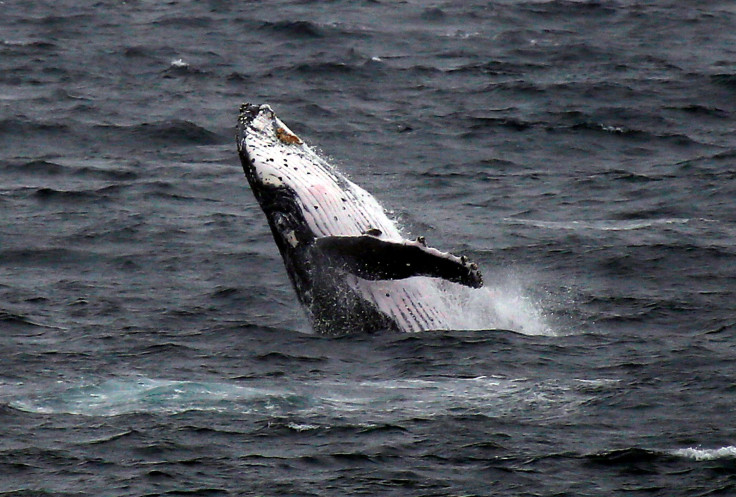Noise Pollution Causes Disruption In Feeding For Humpback Whales, Study Finds

A new study looking at humpback whales in the New England area finds man-made noise disruption to impact the creature’s feeding habits. According to the researchers, freighters and cargo ships emit low-frequency noises that are disrupting.
The researchers used an acoustic tag, equipped with underwater microphones and multiple sensors, to observe the feeding behavior of 10 whales in the Gulf of Maine from 2006 to 2009. Analyzing the data revealed that the large creatures would descend slowly when ships were around and this, in turn, gave them less time to find food.
"If you sit at a black-tie dinner, and someone blows a tuba in your ear, you might get up and leave. Same with the whales and the ship," said G.M. "Hans" Thewissen, an anatomy professor at Northeast Ohio Medical University unaffiliated with the study, to The Associated Press.
Specifically, the presence of a ship would reduce the rate of descent by 14.5 percent and the rate of ascent by 12.8 percent. What’s more, the cetaceans were 29 percent less likely to do side-roll movements, which they whales utilize to consume sand lace fish that are found above the sea floor.
“These findings indicate that humpback whales on Stellwagen Bank, an area with chronically elevated levels of shipping traffic, significantly change foraging activity when exposed to high levels of ship noise,” said the researchers, who published in the Royal Society’s journal Biology Letters, reports The Guardian. “This measureable reduction in within-dive foraging effort of individual whales could potentially lead to population-level impacts of shipping noise on whale foraging success.”
For the researchers, the findings were surprising since humpback whales are quick to adapt. Since the 40-ton marine creatures have spent decades near ships, they anticipated the whales to be less impacted.
"Overall, I was kind of surprised that we were able to detect any response statistically just because these humpback whales are very adaptable," Hannah Blair, a graduate student at Stony Brook University in New York who led the analysis on the data, told The Associated Press.
Should this disruption in feeding be an ongoing issue, it could potentially diminish the fitness in whales. Previous research has found the significance of sound in marine life like whales and dolphins. These animals use sound to communicate with each other and whilst foraging for food. Noise created by humans takes a toll on marine life, as it makes it harder to hear the noises produced by prey.
"They've been having to put up with this for decades probably," said David Wiley, a co-author of the study and a NOAA research coordinator at Stellwagen Bank National Marine Sanctuary, to ABC. "It's another warning that we do need to be very concerned about noise in the oceans because we don't know the impacts."
While the researchers admit the findings are preliminary and it is too soon to make hard claims, it does shed insight into the feeding pattern of whales and spotlight the importance of reducing noise pollution in waters. Earlier this year, the National Oceanic and Atmospheric Administration announced a project that aims to minimize noise in aquatic environments.
© Copyright IBTimes 2025. All rights reserved.






















